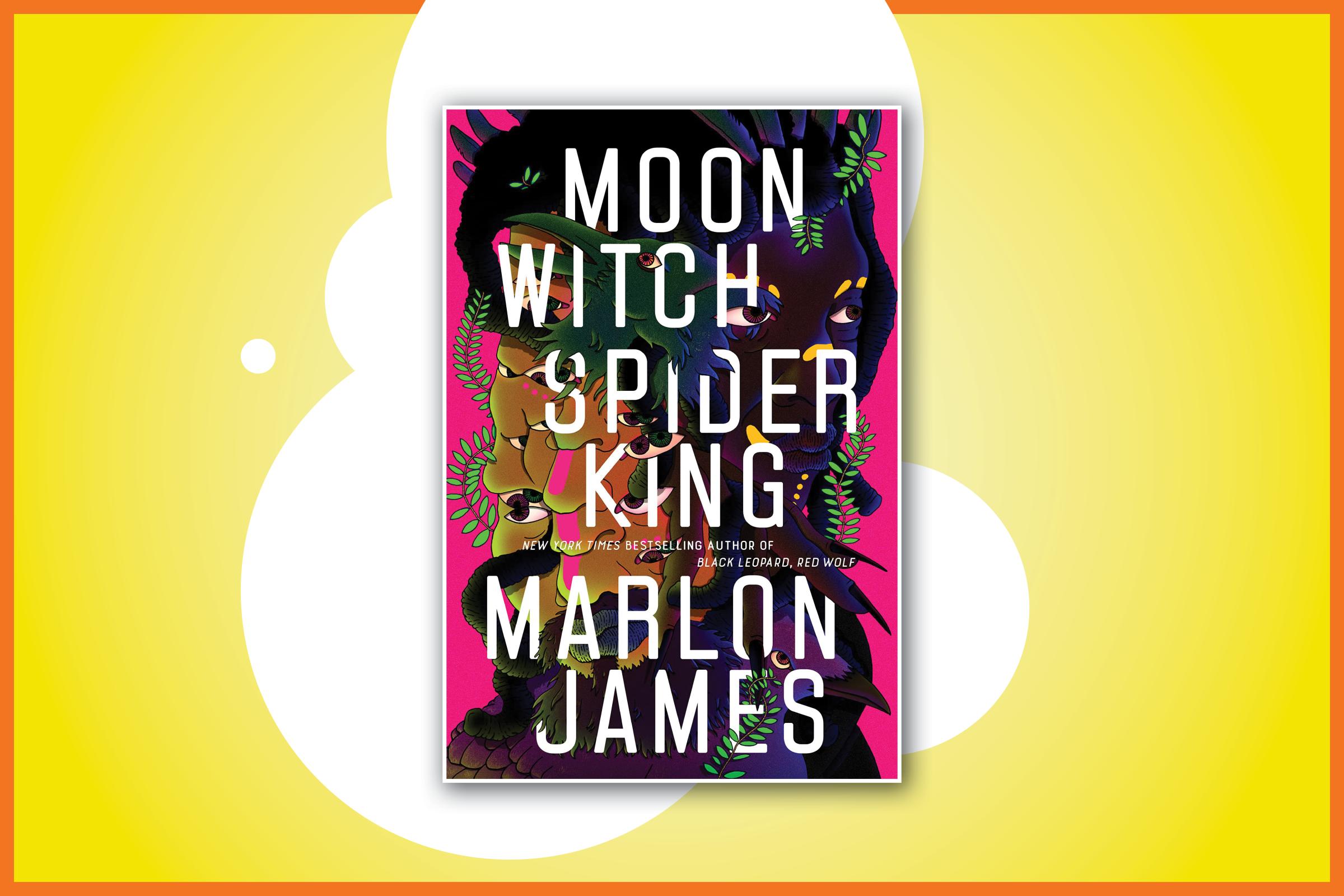
After winning the 2015 Booker Prize for A Brief History of Seven Killings, his decades-spanning, dazzlingly inventive novel centered around a real-life assassination attempt on Bob Marley, author Marlon James embarked on a project of an even more epic scale: the Dark Star trilogy. James’ fantasy series is meant as a corrective to the genre’s oversaturation of European myth and mores. The first of those books, the 620-page quest narrative Black Leopard, Red Wolf, landed in 2019 to wide critical acclaim. James spent months of the pandemic working on the second book in the series, Moon Witch, Spider King, from 10 a.m. to 6 p.m. every day. Out Feb. 15, Moon Witch expands the universe James built in the first novel by retelling the central story—a quest to find and save the missing young heir to the throne of a powerful land—through the voice of a secondary character.
Black Leopard was told from the perspective of Tracker, a drifter with an uncanny ability to hunt down other living creatures. In that first book, Sogolon, the sequel’s titular moon witch, joins Tracker’s hunting party, though her motivations seem suspect at best. But in Moon Witch, James unravels the same events from Sogolon’s perspective, and her journey widens the scope of political intrigue, mythos, and motivations in the Dark Star universe—and forces readers to reckon with a fluid definition of truth.
Read More: The 100 Best Fantasy Books of All Time
James spoke with TIME about his influences, from a prestige television drama to a fellow Booker-winning tome, his desire to bring identity fluidity to the fantasy genre, and how differing cultural notions of truth have impacted his storytelling.
TIME: In Black Leopard, Sogolon seems to be a villain—at the least, she isn’t relatable—while Tracker, though flawed, is the character with whom readers most likely sympathized. In Moon Witch, the two switch roles. That brings up a question the books themselves raise: What is the relationship between storytelling and truth-telling?
James: If we were talking about truth, we would have to go back to oral storytelling, and that’s how far I went back with my research; there are things your eyes will skip that your ears won’t. A lot of these old stories, particularly African stories, didn’t come with a moral center. It’s a very Western thing to believe that the simple fact that you’re telling a story means you have the authority to tell it.
In Jamaican storytelling, there’s a thing that the storyteller says at the end of the story, which I don’t think has a direct translation in English: “Jack Mandora mi nu choose none.” It’s basically meant as a verbal agreement that no blame for inaccuracy should be attributed to either the listener or storyteller. The idea is that just because you told a story, it doesn’t have a stamp of authenticity. I will say that I couldn’t write Moon Witch if I didn’t believe Sogolon. At the same time, I couldn’t write Black Leopard if I didn’t believe Tracker.
I don’t know if I’ve experienced that rejection of the notion of an objective, quantifiable truth in the same way with any other sort of serial fiction telling.
Rashomon, which was three movies about one event, was a model for me. It’s a movie I’ve seen a million times. And—it’s funny, because I have yet to watch the show—the idea of the trilogy moving in a nonlinear and more associative instead of sequential logic came from somebody telling me about the TV show The Affair. I love the idea of two, three people telling supposedly the same story, but they don’t add up at all. Their views on people and on each other are different, and the relationships are different.
Besides Rashomon, any essential texts that you draw from?
When I was writing this, two books were on my desk the whole time: Wolf Hall by Hillary Mantel, and Beloved by Toni Morrison. My character navigates through a royal court that she doesn’t belong to, and there’s the threat of violence at every turn amid all this pomp, ceremony and finery—her biggest struggle is just to stay alive. A lot of that is the influence of Wolf Hall. And then Beloved, because I’m constantly rereading Morrison, one thing she does so well is write about women among women. I’m very interested in those relationships. Sogolon spends quite a big chunk of his book in the presence of daughters, relatives, queens, would-be queens, princesses, and would-be princesses.

The protagonists of both books are shape-shifters, and they are only two among a range of different types of shape-shifting characters you’ve written. I’m curious why you chose to populate your world with individuals of this sort?
The simple answer is that shape-shifters are flippin’ cool. I’ve always loved shape-shifters in comics. Of the holy trinity of monsters—Dracula, Frankenstein, and Wolfman—I was always for the Wolfman.
But also, there’s a connection between the idea of shape-shifting and code-switching. When I first used to come to New York, I would leave the Bronx in my normal clothes, and go to the Barnes & Noble in Union Square and change into my fabulous gay clothes—and then rush back to Barnes & Noble before 10 p.m., like Cinderella, to put on my normal clothes again and head back to the Bronx. Shape-shifters appear in nearly every folklore, and the “transformer” has always been something fascinating to me—if for no other reason than there are times I kind of wish I was somebody else.
That said, I did want to resist the tropes we have with these characters, where when they change into an animal, they’re wild and brutal. None of them are in this book. That would just be me falling into another Western trap—it’s not Id and Superego. It’s almost looking at shape-shifting as another way of being non-binary.
I really like maps and lineages and that encyclopedic aspect of speculative fiction. Moon Witch, Spider King has really unique maps that show the world in even more detail than in Black Leopard. How do those elements play into your writing process?
I was an illustrator in another life. Actually, I once sent an art portfolio to TIME. Needless to say, they sent me a very nice decline letter. This was like 1999. I really hope it’s still not there.
Eudora Welty said setting is a definer and confiner. And both can really energize the work. If I know that this character has to get to the North, but the distance between North and South is half a year, then I have to make the book show that it’s a half-year trip—and that means certain things don’t happen, like there’s no way that a character is on the same horse the whole time. That can add to the drama and intrigue. You want to introduce the world, but you also want people to move. If all you’re doing is world-building, then the reader doesn’t stop being a tourist.
Why did you decide to write a fantasy epic?
It didn’t seem a big jump to me, because there are fantastical elements in all the books I write. Even A Brief History of Seven Killings, which is the closest I’ve come to social realism, the main narrator is a ghost. If I’m writing a fantasy novel, the characters have to feel like they live in a historical novel, because it’s not fantastical to them. It’s fantastical to me, but it’s not fantastical to Sogolon. And because I write in first person, it’s even more urgent that a character has to feel so connected to their surroundings that they take it for granted.
Is that an active choice, to write in first person? Or do you feel like you can only write in first person?
Damn if I know. I’m not as confident in third person as I am in first. But I’m also interested in voice and tone of voice as a concept. That doesn’t mean you can’t have third-person with a fantastic voice, but for me, novel writing comes down to a kind of imaginative journalism, and I am very much interested in character testimony. I feel like I’m just a record keeper when I write these books. I’m always getting surprised by what these characters do and say, because I don’t feel like I’m in control of them.
What does the “Dark Star” in the Dark Star trilogy refer to?
You’re gonna have to read the third book to find out. The third one is called White Wing, Dark Star.
This interview has been condensed and edited for clarity.
More Must-Reads from TIME
- Cybersecurity Experts Are Sounding the Alarm on DOGE
- Meet the 2025 Women of the Year
- The Harsh Truth About Disability Inclusion
- Why Do More Young Adults Have Cancer?
- Colman Domingo Leads With Radical Love
- How to Get Better at Doing Things Alone
- Michelle Zauner Stares Down the Darkness
Contact us at letters@time.com